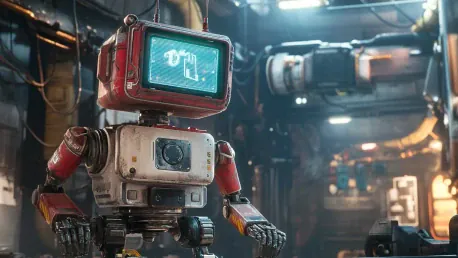Anand Naidu, our resident Development expert, is proficient in both frontend and backend development. He brings deep insights into various coding languages and has a keen eye on how artificial intelligence is transforming the gaming industry. Today, he shares his perspectives on the revolutionary impact of AI on game design and development.
How has AI impacted the gaming industry in recent years?
AI has drastically transformed the gaming industry by enabling more sophisticated and dynamic game environments. For instance, AI algorithms can create realistic worlds, evolving character interactions, and even personalize experiences based on player preferences. This not only has enhanced gameplay but also improved development workflows, making the creation process faster and more efficient.
What are the key ways in which AI is redefining game development and players’ experiences?
AI redefines game development by automating complex tasks such as procedural world generation and NPC behavior. This results in more immersive and dynamic gaming experiences. For players, AI brings personalized content, adaptive difficulty levels, and more engaging storytelling. Essentially, AI makes games feel alive, where the world reacts to player actions in real-time, making each playthrough unique.
Could you explain the concept of procedural world generation using AI?
Procedural world generation involves using AI algorithms to create vast, intricate game environments automatically. Traditional methods require manual crafting of landscapes and levels, but AI can achieve this in a fraction of the time. Games like Minecraft and No Man’s Sky showcase this beautifully, generating unique worlds that evolve based on player interactions, enhancing replayability and reducing developer workload.
How does AI enhance NPC behavior in games?
AI enhances NPC behavior by allowing characters to react intelligently to player actions. Unlike pre-programmed NPCs, AI-driven NPCs can adapt their responses, learn from past interactions, and change strategies. This leads to more realistic and engaging interactions. For example, in stealth games, AI enemies alter their patrol routes based on player movements, creating a more challenging and immersive experience.
How is AI utilized in storytelling and dialogue systems within games?
AI in storytelling and dialogue systems allows for dynamic and personalized narratives. Instead of fixed dialogue trees, AI-driven systems generate conversations that adapt to player choices. This results in more natural and engaging interactions. Games like Cyberpunk 2077 and Mass Effect use AI to make dialogue feel more meaningful, giving players a greater sense of agency and influence over the storyline.
In what ways has AI improved game testing and bug detection?
AI has revolutionized game testing by automating the process of identifying bugs and performance issues. AI-powered tools can simulate thousands of gameplay scenarios quickly, detecting inconsistencies and areas for improvement that human testers might miss. This improves efficiency and allows developers to focus more on enhancing the gaming experience instead of manual debugging.
How does AI contribute to creating personalized gaming experiences?
AI personalizes gaming experiences by analyzing player behavior and preferences. Machine learning algorithms adjust difficulty levels, recommend content, and tailor experiences to individual playstyles. Moreover, AI enhances accessibility by customizing interfaces and controls based on player interactions, making games more inclusive for those with disabilities.
What is the potential future of AI in game development?
The future of AI in game development is incredibly promising. We might see fully autonomous game creation, where AI generates entire games from developer input. This could democratize game development, reducing costs and speeding up production. AI-driven content creation tools are also likely to become more advanced, enabling developers to produce high-quality art, music, and animations more efficiently.
What role does AI play in refining game design through player analytics?
AI-driven player analytics help refine game design by analyzing player behavior to understand what keeps players engaged. This data allows developers to create smarter, more user-friendly game mechanics and enhance overall gameplay experiences.
What challenges do developers face when integrating AI into game design and development?
Developers face several challenges when integrating AI into game design, including the complexity of AI algorithms, the need for extensive data to train AI models, and ensuring AI behavior aligns with creative visions. Balancing AI sophistication with player expectations can also be tricky, as overly complex AI might overwhelm players or detract from the intended gameplay experience.
How do you see AI impacting the creativity and innovation of future game developments?
AI is poised to significantly enhance creativity and innovation in game development. By automating mundane tasks and providing powerful tools for procedural generation and dynamic storytelling, AI allows developers to focus more on creative aspects. This leads to richer, more diverse game worlds and narratives, pushing the boundaries of what is possible in gaming.
Can you provide real-world examples of how AI has enhanced specific games?
Games like Red Dead Redemption 2 and The Last of Us Part II demonstrate the power of AI in creating lifelike NPCs that respond to player actions. Minecraft and No Man’s Sky showcase procedural generation, while Cyberpunk 2077 and Mass Effect highlight advanced AI-driven dialogue systems. These examples vividly illustrate the transformative impact of AI on gaming experiences.
How does AI help in balancing difficulty levels in games?
AI helps in balancing difficulty levels by dynamically adjusting challenges based on player performance. Games like The Legend of ZeldBreath of the Wild use AI to ensure players remain engaged without frustrated, providing a balance that keeps gameplay enjoyable and rewarding.
In terms of production costs and development time, what are the main advantages of using AI?
AI offers significant advantages in reducing production costs and development time by automating complex tasks such as game testing, world generation, and NPC behavior scripting. This streamlines workflows, minimizes manual labor, accelerates the creation process, and frees up resources for creative endeavors.
How has the use of AI in game development influenced the overall player experience?
AI has dramatically enhanced player experience by creating more immersive, dynamic, and personalized worlds. Players enjoy richer interactions with NPCs, tailored gameplay, and narratives that feel responsive to their choices, making the overall experience more engaging and memorable.
Do you have any advice for our readers?
Stay curious and keep learning. The gaming industry is rapidly evolving, and staying updated on technological advancements like AI can open up new opportunities for creativity and innovation. Embrace the possibilities that AI offers, and think about how you can leverage this technology to enhance your own projects or gameplay experiences.









